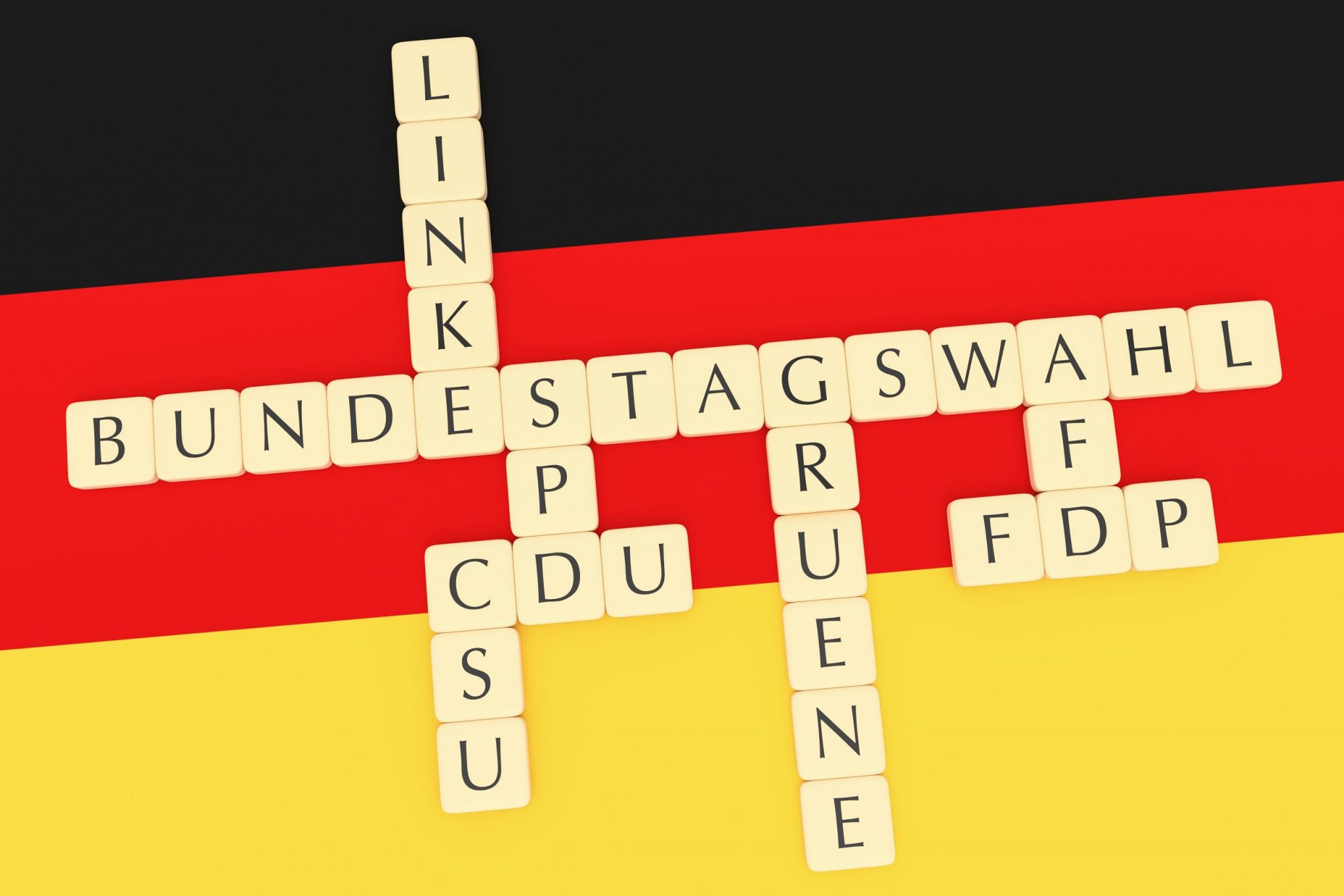Why It Matters
After 16 years of government under Chancellor Angela Merkel and 8 years in a so-called “grand coalition” between the CDU/CSU and the SPD, it is all but certain that the federal elections in September will bring a change in government. This also means that there will probably be a change in foreign policy. Given Germany’s role as a primary target of information manipulation, it is relevant to understand how the different parties aim to design their foreign policies regarding autocratic foreign actors and how they intend to address the problem of information manipulation.
The Parties
The Christian Democratic Union (CDU) and its Bavarian sister party, the Christian Social Union (CSU), and their chancellor candidate Armin Laschet are on the center-right of the political spectrum. Their election agenda entitled “stability and renewal” tries to strike a balance between continuing the course of the past 16 years in government and bringing the country forward with new ideas. The Social Democratic Party of Germany (SPD), led by chancellor candidate Olaf Scholz, is traditionally a center-left party. The SPD focuses on the themes of “Future. Respect. Europe.” in its election agenda. The center-left party Bündnis 90/Die Grünen (the Greens) has been on a clear upward trajectory over the past couple of years. Chancellor candidate Annalena Baerbock runs an election campaign that primarily revolves around climate-related issues. The Free Democratic Party (FDP) is a classical liberal party that supports free-market economic policies and represents liberal views. The so-called Alternative for Germany (AfD) is Germany’s populist far-right party. Its policy proposals are primarily marked by nationalist ideas. The Linke (Left) is the party that is furthest left out of the main German parties. Its election agenda focuses on three topics: social security, peace, and climate justice.
The Big Picture
The four centrist parties—CDU/CSU, FDP, Greens, and SPD—all have a strong commitment to the European and transatlantic orientation of German foreign policy. Despite varying policies, the parties all advocate for further European integration through the European Union (EU) and consider the transatlantic relationship and its defense alliance NATO to be integral to German foreign and defense policy. In contrast, the Linke calls on the EU to make major policy changes and structural reforms, while the AfD demands a renationalization of European politics. Furthermore, the AfD calls for NATO to limit itself to defense measures and refrain from deployments outside member countries. The Linke considers NATO a relic of the Cold War and advocates for a new collective security alliance that includes Russia.
Russia
Outside of the AfD and the Linke, all parties strive to strike a balance between engaging and containing Russia. There is a consensus that cooperation and dialogue with Russia on certain issues, such as climate change, are essential. The FDP, Greens, and SPD also highlight the important role of continued support for Russia’s civil society. Yet, the party platforms also contain varying degrees of pessimism vis-à-vis Russia: The Linke acknowledges that Russia contributes to an increasingly insecure world (and its platform also suggest that the United States and the EU are disrupting actors), but it rejects the notion of seeing Russia as a foe. The other parties explicitly condemn different Kremlin policies, from cyberattacks and information manipulation to domestic oppression and Russia’s aggression in Ukraine. The AfD and the Linke both call for more engagement with and a relaxation of policies towards Moscow. The AfD wants to include Russia in a comprehensive security structure, and the Linke aims for a German-Russian treaty to reach reconciliation and friendship between the countries.
The FDP and the Greens put forth the most assertive platforms regarding Russia, advocating for a continuation of EU sanctions against Russia unless the conditions for relaxation are met and even raising the possibility of tightening sanctions in case of further military escalation in Ukraine. In contrast, the AfD and the Linke demand an end to the sanctions and aim for a relaxation of relations with Russia.
A similar split is apparent regarding the Nord Stream 2 gas pipeline. The Greens want the immediate end of its construction due to ecological and geopolitical reasons, and the FDP calls for a moratorium until Russia allows an independent and comprehensive investigation into the case of Russian dissident Alexei Navalny and the general human rights situation improves. The current government factions CDU/CSU and SPD are internally split on the issue and do not mention the topic in their election agendas. Meanwhile, the AfD and the Linke support a completion of the gas pipeline (the Linke does not mention Nord Stream 2 in its agenda but has clearly communicated its position in the past).
China
As part of their general foreign policy preferences, CDU/CSU, FDP, the Greens, and SPD advocate for the development of a European strategy towards China. The conservatives and the Greens also aim for transatlantic coordination vis-à-vis China. Interestingly, both parties’ election agendas characterize China with the exact same words: competitor, partner, and strategic rival. However, in a different paragraph, the Greens also describe China (and Russia) as a country with “authoritarian hegemonic aspirations […] which systemically undermine[s] human and citizens’ rights, put[s] other countries in a position of economic and political dependency, […] and want[s] to divide Europe.” The Linke, on the other hand, rejects notions of China as a foe and wants to integrate the country in disarmament efforts—an idea supported by the Greens and the SPD. The two center-left parties also acknowledge that China’s economic and political position makes cooperation on global challenges such as climate change inevitable.
In general, there are varying degrees to which the parties favor cooperation with Beijing. The CDU wants to strike a balance between cooperating where possible and confronting China on the protection of intellectual property, high technology, and data. While the AfD sees China’s global exertion of influence as a challenge, it simultaneously campaigns for Germany’s “aggressive participation” in China’s Belt and Road Initiative (BRI). The FDP also aims for further development of EU-Chinese economic and civil society relations and considers the Comprehensive Agreement on Investment (CAI) an important step for further economic cooperation, despite the flaws of the agreement. Both the liberals and the Greens demand adjustments to the CAI regarding equal market access and human rights. All parties but the Linke demand mutual fair market access with China.
On the topic of human rights, there is a clear divide on who addresses the issue. FDP, the Greens, and SPD sharply criticize China’s human rights record and denounce Beijing’s policies vis-à-vis Taiwan and Hong Kong. The Greens and SPD also explicitly mention the situation in Xinjiang. In contrast, the Linke, CDU/CSU, and AfD make no mention of human rights in their coverage of China.
Information Manipulation
Multiple, albeit not all, parties address the issue of information manipulation in their election platforms. The Greens want to enhance the national and European structuring of media oversight to counter information manipulation. Along with the Linke, they also aim to strengthen education programs against disinformation, with the Linke rejecting censoring content as a tool to counter information manipulation. Similarly, the FDP advocates for lifelong education concepts to teach digital and media literacy. The SPD aims to tackle the issue at a more structural level by establishing a European early warning system against disinformation campaigns. Neither the CDU/CSU nor AfD address this issue in their election platforms.
Conclusion
Overall, there are many shared views between the CDU/CSU, FDP, Greens, and the SPD, most importantly in their European and transatlantic approaches to different foreign policy challenges. However, there is also a fair amount of divergence in the details. The FDP and the Greens position themselves as the most assertive parties both on Russia and China, while the conservatives and social democrats present more cautious programs. The Linke’s foreign policy primarily relies on calls for global disarmament and a relaxation of policies towards Russia and China. The AfD is equally reserved about Russia but presents some contradictory views on China, aiming to cooperate on the BRI while demanding fairer trade conditions. The different party programs only superficially cover information manipulation. Nonetheless, the fact that this topic receives attention from four out of the six parties that are currently part of the Bundestag highlights the growing importance of the topic.
The views expressed in GMF publications and commentary are the views of the author alone.





